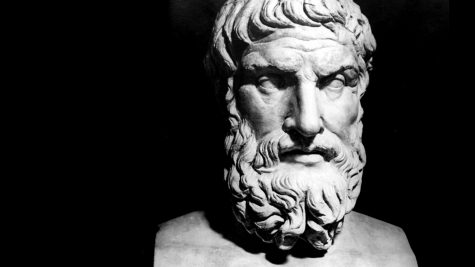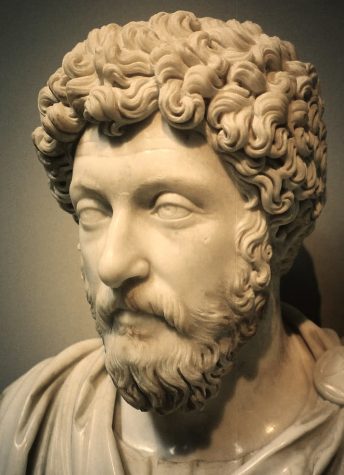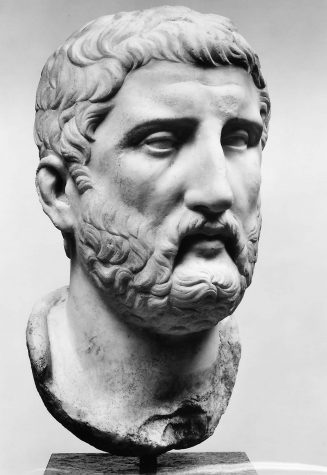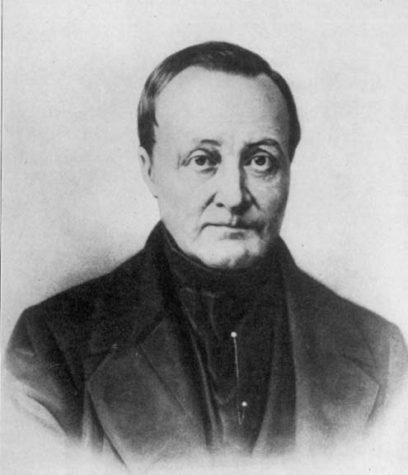What is the meaning of life?
Should SSES students be studying philosophy in school? An overview of major western philosophies might give us some insight.
October 12, 2016
All throughout history, beginning as far back as 2,500 years ago, people with time on their hands have asked themselves the big questions: “Why am I here?”, “Why is the world the way it is?”, “What is morally right and wrong?”, and the ever famous, “What is the meaning of life?” This way of thinking about humanity’s place in the world became so popular that it earned a name: Philosophy.
The word “philosopher,” which comes from Greek, literally means “lover of wisdom.” Different philosophers’ ideas and perspectives can tell us a lot about their time periods; their ideas reflect the knowledge, lifestyle, and ideals of the people who lived then. The most important question for Saint Stephen’s, though, is: “Is philosophy good for students?” There are those who say that some philosophical ideas could be a bad influence, while there are those who say just the opposite. Saint Stephen’s needs someone to come up with a definitive answer. Well the wait is over. By assessing many schools of thought within western philosophy, I hope to answer the biggest question Saint Stephen’s has ever asked.
A Brief History of Philosophy
Philosophy in the West started with the ancient Greeks, with a man from a town called Miletus on the western coast of present day Turkey. This man, named Thales, was the first man in the Western Hemisphere documented to have used natural explanations for natural phenomena instead of using religion to explain everything. After asking himself where the world came from, he concluded that everything comes out of water, and that the Earth is floating on water. These ideas, however simple, were the beginning of philosophy in the western world.
The more famous Greek philosophers lived in ancient Athens. The first of these was Socrates, who brought the idea of ethics into the world of thought. He spent his life asking himself and others what is right and what is wrong and how do we determine morality. Not all people agreed with his desire for inquiry, however, and he was put to death. His successors, Plato and Aristotle, wrote about all sorts of philosophy, including metaphysics, aesthetics, and even politics. Their work inspired many later philosophers.
Philosophy regained popularity in the 11th century. Although, this time, most philosophers set out to prove their religious ideas. There were, however, some exceptions. Roger Bacon said that the origin of all knowledge is sense experiment and came up with the scientific method, and Francis Bacon continued to advocate for empiricism, or the belief that all truth requires evidence from the real world. Philosophical thought really began to pick up, though, in the 17th and 18th centuries, with people like René Descartes (author of the famous “I think, therefore I am.”) and Gottfried Liebniz, who theorized that the world is made of monads, which he said are the ultimate elements of the universe.
The 19th century saw the birth of Karl Marx’s idea of communism, a political idea that become very popular in early 20th century Europe. Ralph Waldo Emerson’s idea of transcendentalism, or the rejection of all technology and return to the wild, also came about during this time. During the more modern 20th century, philosophers like Jean-Paul Sartre and his contemporaries, Albert Camus and Simone de Beauvoir, enriched the century with their many ideas on ethics, metaphysics, logic, and many other topics. The most famous of these is Camus’s absurdism, or the idea that there is no way to explain the universe because it is too absurd. That brings us to today, where philosophy is sadly both underrepresented and under-appreciated.
Epicureanism
Let’s start off with something simple. Epicureanism, started by the Greek philosopher Epicurus around 307 B.C., is very similar to hedonism. Epicureanism is the belief that happiness, or the greatest good comes from pleasure. Epicurus taught that everyone should strive to spend their life in a state of happiness by seeking simple pleasures, tranquility, freedom from fear, and the absence of pain. While this sounds like a really nice way to live, it may not be a good influence on students, as it could encourage them to abandon their homework in favor of pursuing the pleasures of Epicureanism. One point goes to no.
Stoicism
Stoicism is another ancient school of philosophy. It was started by Zeno of Citium around 300 B.C. Some other famous stoics are Epictetus, a former slave, and Marcus Aurelius, an emperor of Rome and author of Meditations. Stoicism taught the development of self-control and discipline. Stoics use logical thinking to free their mind from strong harmful emotions, giving them inner calm and freedom from suffering. Many ancient Greeks and Romans saw it as a way of life, even training themselves to think that way. Stoicism can be a very good thing for students. It can help students avoid stress and allow them to think more clearly both in and out of class. One point goes to yes.

Rationalism
Rationalism, which gained popularity in 17th century Europe, is a more modern school of philosophy. Rationalists follow the belief that all knowledge comes from logical and deductive reasoning and not from sensory experience. Rationalism says that the path to all knowledge should follow a logical and structured path that proves that the knowledge exists. Rationalists believe that there are two types of knowledge: outside knowledge and innate knowledge, both of which must be gained through pure reason. They were strong supporters of the scientific method. Rationalism would be a very good influence on students, who could learn from the idea of logical reasoning. They can question their knowledge and gain new knowledge using logic and deductive reasoning. One point for yes.
Determinism
Determinism, the modern name for the ideas of the Greek philosopher Democritus, is the belief that all events are predetermined by laws that control everything, including human minds. However, some determinists do believe that humans have free will- as long as their choices fit into the chain of predetermined events. Another group of determinists believe that the laws that control the universe were created by God, while a different group believe that these laws came into existence at the beginning of the universe, and that everything since then has been laid out in a line that it has to follow. Determinism may not be a good influence on students, because it could discourage them from creating their own future. If they believe that their future is already laid out for them, they may give up on their dreams, believing that they weren’t meant to happen. They may do whatever they think they are supposed to do, even if they don’t want to. One point goes to no.
Nihilism
Nihilism is considered by some to be anti-philosophical. It is essentially the idea that life has no meaning, purpose, value, or truth. Nihilists do not believe that there is any God or higher power. Friedrich Nietzsche, the philosopher most associated with nihilism, said some depressing things, like “To live is to suffer, to survive is to find some meaning in the suffering.” In short, nihilists believe that life is pointless. Although there is a lot of good meaning to get from nihilism, it seems pretty obvious why it could be bad for students. But, just in case you can’t figure it out, I’ll make it simple: it can be depressing. I think I’ve said enough. One point for no.
Altruism
Altruism, the final mode of thought on this list, was a word coined by French philosopher, Auguste Comte, to describe his ethical doctrine. Altruism says that an action is morally right if it is beneficial to anyone other than the person who performed the action. It states that everyone has a moral obligation to serve the people around them in any way they can. This can be a very good influence on students, as it can inspire them to help others, especially through community service. This last point goes to yes.
So is philosophy good for students?
So now we’re back to the original question: is philosophy good for students? After looking at six groups of philosophy, yes has three points and no has three points, making it a tie. So, I’m going to ignore the score. My official conclusion is that yes, philosophy is good for students. Why? Because philosophy makes people think. When students think about philosophy, their minds work in ways that they don’t under normal circumstances. Philosophy can encourage students to think about other people’s points of view while also examining their own. It can expand students minds by giving them something to think about that is not black and white. So go ahead, read some philosophy and expose your mind to ideas that are not as black and white as the things you learn in your day-to-day classes. You might even learn something about yourself in the process.




























































